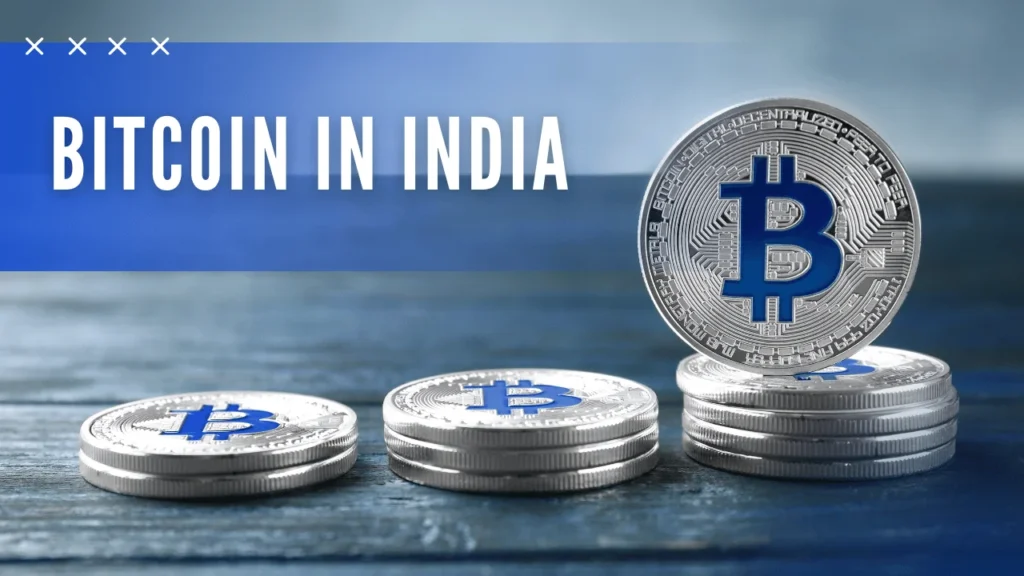The advent of digital currencies like Bitcoin has brought both new possibilities and new threats to economies all over the world. One of the most interesting examples is the Indian economy, where the intersection of Bitcoin and Indian economy sparks significant discussions. The way India deals with Bitcoin can teach us a lot about how society, technology, and money will evolve in the future, thanks to its large population, ever-changing economy, and rapid digitization.
Bitcoin in India

Bitcoin
Bitcoin is essentially a decentralized digital currency that operates autonomously from a single administrator or central bank. It can be sent directly from user to user on the bitcoin network, eliminating the need for middlemen. In 2009, a mysterious figure going by the name of Satoshi Nakamoto introduced Bitcoin. Since then, Bitcoin has become the most valuable cryptocurrency in the world. The revolutionary nature of this financial instrument is rooted in its underlying technology, blockchain, which guarantees immutability, security, and transparency of transactions.
Redefining Financial Transactions
The idea of monetary transactions has been revolutionized by Bitcoin. There are a lot of benefits over more conventional banking systems, such as its speed, security, and global reach. By reaching out to the underbanked and unbanked, Bitcoin could speed up the process of financial inclusion in India, a country with a booming digital economy, and encourage more people to get involved in the economy.
Tool for Economic Empowerment
In addition to providing an alternative investment option, Bitcoin’s acceptance in India represents a means of economic empowerment. Bitcoin enhances domestic and international trade and commerce by facilitating direct, peer-to-peer transactions; this cuts out intermediaries, reduces fees, and boosts transaction speed.
Magnet for Investors
An increasing number of Indian investors are drawn to Bitcoin for its unique properties, like its limited supply and resistance to inflation. Despite the fact that its value can rise and fall quickly, many still consider Bitcoin to be a digital gold that could protect them from inflation and economic instability.
Impact on Indian Businesses
Businesses in India can benefit from the potential for operational simplification brought about by bitcoin and blockchain technology. Decentralized blockchain technology has the potential to revolutionize supply chain management, secure financial transactions, and other industries by cutting costs, increasing efficiency, and opening up new possibilities for innovation.
Digital Currency Landscape in India
Regulatory Environment
Bitcoin in India has encountered a complicated and ever-changing regulatory landscape. The Reserve Bank of India (RBI) and the Indian government are worried that cryptocurrency could be used for terrorist funding or money laundering. The technological advances brought about by blockchain and cryptocurrencies are, however, also acknowledged. In order to incorporate Bitcoin into India’s financial system, it is essential to weigh these concerns against the possible advantages.
Bitcoin Adoption in India
Bitcoin is gaining popularity in India despite the country’s unclear regulatory landscape. The need for safer and more efficient online transactions has prompted an explosion in the number of companies and startups investigating blockchain and Bitcoin. This expansion reflects a broader worldwide movement towards digital currencies, which have the ability to revolutionize the economy.
Economic Growth and Digital Currencies
Bitcoin and other digital currencies might make a big dent in India’s GDP growth. Bitcoin can improve economic efficiency and spur growth by enabling quicker and more efficient transactions, lowering transaction costs, and opening up new markets.
Financial Security and Innovation
A major benefit of Bitcoin is the transparency and security it provides, which can greatly lessen the likelihood of fraud and increase confidence in monetary transactions. Adopting Bitcoin and blockchain technology might be a huge step toward protecting financial transactions in a nation like India, where online fraud is an issue.
Challenges and Opportunities
Volatility and Risk Management
The unpredictability of Bitcoin’s value is a major obstacle to its widespread use in India. It is critical for companies and investors to manage the risks connected with price fluctuations. One way to address these concerns is by providing prospective users with information about the benefits and drawbacks of Bitcoin.
Integrating Bitcoin with Traditional Banking
The conventional banking and financial systems of India might stand to benefit and suffer from the integration of Bitcoin and other digital currencies. Strong regulatory frameworks are necessary to prevent abuse and safeguard consumers, even though it has the ability to bring about more inclusive and efficient financial services.
Innovation and Economic Stability
Bitcoin and blockchain technology have the potential to greatly benefit India’s burgeoning economy by encouraging new ideas and reducing volatility. India can establish itself as a frontrunner in the future digital economy by adopting these technologies.
Bitcoin for Economic Development
The widespread adoption of Bitcoin in India’s economy is an encouraging sign of the future of global finance. Being a digital asset, it offers a chance to accelerate growth in different industries by removing the usual constraints on access to financial services.
Job Creation
There will be a dramatic increase in employment opportunities in a wide range of industries as a result of the widespread use of blockchain technology and cryptocurrencies like Bitcoin. Blockchain developers, cybersecurity specialists, and financial analysts with a focus on digital currencies are seeing increased demand as more and more companies and sectors adopt these technologies. India aspires to become a global technology hub, and this technological shift has the potential to create many job opportunities, especially in the technology sector.
SMEs’ Access to Capital
The Indian economy relies on small and medium-sized businesses (SMEs). By opening up new global markets and financial instruments, Bitcoin has the potential to dramatically alter the way SMEs get funding. Through initial coin offerings (ICOs) and tokenization, SMEs can raise funds more efficiently, bypassing traditional hurdles and high costs associated with bank financing.
Financial Inclusion
Many people in India do not have bank accounts or have inadequate ones. Due to its decentralized nature, Bitcoin can facilitate financial inclusion by removing the need for a centralized banking system. Millions of people could gain independence and improve their economic standing and standard of living if this made it easier for them to save, borrow, and conduct transactions online.
International Trade
Bitcoin and other digital currencies can strengthen India’s position in international trade. Bitcoin has the potential to make international transactions easier and cheaper by lowering transaction fees and doing away with currency exchange issues. Indian importers and exporters can take advantage of Bitcoin to simplify their operations and access new markets.
Addressing the Challenges Ahead
Several obstacles stand in the way of Bitcoin’s widespread adoption in India’s economy. A more equitable, efficient, and secure economic future is possible, though, if these are adequately addressed.
Regulatory Clarity and Compliance
Ensuring a harmonious coexistence of innovation and regulation is of utmost importance. To safeguard buyers, forestall financial crimes, and cultivate a steady economic climate favourable to the expansion of digital finance, transparent and uniform rules and regulations governing Bitcoin and other digital currencies are crucial.
Security and Privacy
There is no denying the increasing number of cyber threats linked to digital currencies, even though Bitcoin has better security features. To lessen the impact of these threats, it is essential to educate users on how to safely use digital financial services and to strengthen cybersecurity measures.
Managing Market Volatility
Investors and the economy are put at risk by Bitcoin’s inherent volatility. Businesses and individuals wishing to accept Bitcoin as payment or invest in it must develop strong financial tools and methods to protect themselves from this volatility.
FAQs
1. How does Bitcoin enhance financial inclusion in India?
The decentralized nature of Bitcoin makes it possible for individuals who do not have access to traditional banking services to engage in safe, peer-to-peer transactions.
2. Can Bitcoin transactions reduce fraud?
There is far less room for fraud in monetary transactions because Bitcoin’s blockchain technology is transparent and unchangeable.
3. What are the risks of investing in Bitcoin for Indian investors?
Unpredictability in the market is the main danger. Bitcoin investors should be aware that the price of the cryptocurrency can experience large fluctuations.
4. How is the Indian government regulating Bitcoin?
In order to prevent illicit activities while encouraging innovation, the Indian government and regulatory agencies are presently assessing the most effective ways to control cryptocurrency.
5. Can Bitcoin impact India’s GDP growth?
Bitcoin may have a positive effect on India’s GDP growth by expanding access to financial services, decreasing transaction fees, and creating new avenues for business.
Also Read: Indian Bitcoin Exchanges 2024
Conclusion
The space where Bitcoin and Indian Economy is one that is always changing and full of possibilities for revolutionary shifts. Regulatory frameworks, education, and innovation must be carefully considered as India moves forward in navigating the opportunities and challenges posed by digital currencies. Bitcoin and blockchain technology offer India a chance to strengthen its economy, encourage development, and give its people more agency in the modern digital world.

Timothy Jensen is an expert writer who specializes in the world of cryptocurrencies, including blockchain technology and Bitcoin. He has a passion for explaining complex topics in an easy-to-understand way. Timothy’s work aims to demystify the digital currency landscape for his readers.

